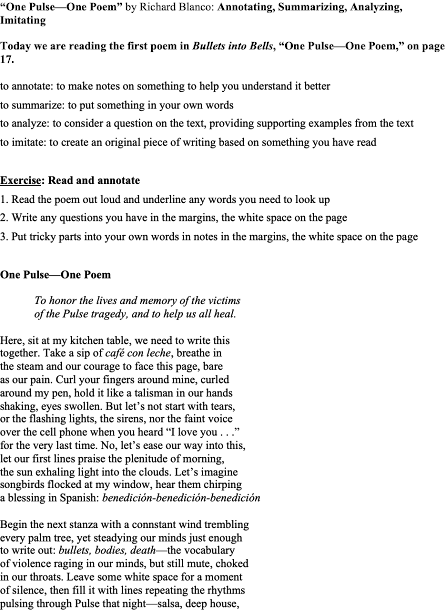Week 80: College Reading and Writing: Tretheway and Weingart
Week 80:
College Reading and Writing: Tretheway and Weingart
Natasha Tretheway
and Eddie Weingart: Annotating, Summarizing, Analyzing, Imitating
to annotate: to make notes on something to help you
understand it better
to summarize: to put something in your own words
to analyze: to consider a question on the text, providing
supporting examples from the text
to imitate: to create an original piece of writing based on
something you have read
We are doing the poem and response in the book today, starting
on page 161.
Exercise: Read and annotate
1. Read the poem and response out loud and underline any
words you need to look up.
2. Write any questions you have in the margins or in your
notebook.
3. Put tricky parts into your own words in notes in the
margins or in your notebook.
Exercise: Questions for Comprehension of the poem
1. What is Saint
Gertrude called to write?
2. What are Saint
Gertrude’s “instruments”?
3. What is the
ultimate connection between Saint Gertrude and the speaker’s mother?
Exercise: Summarize the poem
Write a
paragraph summarizing the poem with quotations, in-text citation, and a Work
Cited Page.
example too-short summary, incorporating quotation
and in-text citation:
Natasha
Tretheway’s poem begins by explaining “the legend” (161) of Saint Gertrude:
“Saint Gertrude is called to write after seeing, in a vision, the sacred heart
of Christ” (161). The speaker then goes on to describe in great detail Miguel
Cabrera’s painting of Saint Gertrude :Against the dark backdrop, her face is a
wafer of light” (161). Immediately after this line, the speaker begins to
compare the painting to the last photograph her mother had taken before she
died.
Work Cited Page (for
today’s poem)
Tretheway, Natasha. “Articulation.” Bullets Into Bells: Poets and Citizens Respond to Gun Violence. Ed.
Brian Clements et al. Beacon Press, 2017.
Exercise: Questions for Comprehension of the response
- What is the main reason the poem resonates with Weingart?
- What was
Weingart’s mother’s instinct?
- What are
Weingart’s “three types of memory” of his mother?
Exercise: Summarize the response
Write a
paragraph summarizing the response with quotations, in-text citation, and a
Work Cited Page.
Exercise: Analysis
Question for
analysis: In the poem, Tretheway subtly compares her mother to Saint Gertrude.
In his response, Weingart makes it clear that his mother was willing to
sacrifice her life for his. What is the significance of Tretheway and Weingart
comparing their mothers to saints?
Exercise: Imitation
Write an ekphrastic poem in couplets.
Homework:
- Summary of
Poem
- Summary of
Response
- Analysis of
Poem and Response
- Imitation of
Poem
About this class:
In this class, you are welcome to
submit homework for a grade. If it’s not
strong enough to earn an A, I’ll give you some comments to help you revise it,
and let you do it over again. You have as many chances as you want to complete
and perfect the work in this class, and you are welcome to do more than one
week’s worksheet for homework at a time; ask me for sheets you’ve missed. Students who complete 15 weeks of graded assignments
and a longer paper can qualify for college credit. When you get close to completing 15 weeks,
I’ll help you get started on your longer paper.


Comments
Post a Comment